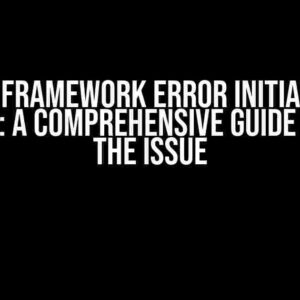Are you tired of wrestling with the generic form of a JsonConverter in System.Text.Json? Do you find yourself stuck in a never-ending loop of confusion and frustration? Fear not, dear developer, for we’re about to embark on a journey to untangle this knotty problem once and for all!
The Problem: A Brief Introduction
The System.Text.Json namespace, introduced in .NET Core 3.0, provides a high-performance, low-allocating API for working with JSON data. While it offers many benefits, it also presents some challenges, particularly when dealing with generic types and JsonConverters. In this article, we’ll delve into the heart of the issue and explore ways to resolve the generic form of a JsonConverter.
Understanding the Generic Form of a JsonConverter
A JsonConverter is a class that inherits from JsonConverter
public class GenericType<T>
{
public T Value { get; set; }
}
public class GenericJsonConverter<T> : JsonConverter<GenericType<T>>
{
public override GenericType<T> Read(ref Utf8JsonReader reader, Type typeToConvert, JsonSerializerOptions options)
{
// Custom deserialization logic
}
public override void Write(Utf8JsonWriter writer, GenericType<T> value, JsonSerializerOptions options)
{
// Custom serialization logic
}
}In this example, we have a generic type GenericType
The Issue: Resolving the Generic Form
When we try to use the GenericJsonConverter
JsonSerializerOptions options = new JsonSerializerOptions();
options.Converters.Add(new GenericJsonConverter<int>());
// Error: Cannot convert GenericJsonConverter<int> to JsonConverter<object>The error message is quite clear: the compiler can’t convert the GenericJsonConverter
The Reason: Type Inference and Covariance
The reason behind this error lies in the way type inference works in C#. When we create an instance of GenericJsonConverter
The problem is that C# doesn’t support covariance in generic type parameters, which means we can’t assign a GenericJsonConverter
Resolving the Generic Form: The Solution
So, how do we resolve this issue? There are a few approaches we can take:
Approach 1: Using a Non-Generic Converter
One way to resolve the generic form is to create a non-generic converter that wraps the generic one:
public class IntJsonConverter : JsonConverter<object>
{
private readonly GenericJsonConverter<int> _converter;
public IntJsonConverter()
{
_converter = new GenericJsonConverter<int>();
}
public override bool CanConvert(Type typeToConvert)
{
return typeof(int).IsAssignableFrom(typeToConvert);
}
public override object Read(ref Utf8JsonReader reader, Type typeToConvert, JsonSerializerOptions options)
{
return _converter.Read(ref reader, typeToConvert, options);
}
public override void Write(Utf8JsonWriter writer, object value, JsonSerializerOptions options)
{
_converter.Write(writer, (GenericType<int>)value, options);
}
}In this approach, we create a non-generic converter, IntJsonConverter, that wraps the generic GenericJsonConverter
JsonSerializerOptions options = new JsonSerializerOptions();
options.Converters.Add(new IntJsonConverter());Approach 2: Using a Converter Factory
An alternative approach is to use a converter factory that creates the correct converter instance based on the type:
public class JsonConverterFactory
{
public static JsonConverter CreateConverter(Type type)
{
if (type.IsAssignableFrom(typeof(int)))
{
return new GenericJsonConverter<int>();
}
else
{
throw new InvalidOperationException($"Unsupported type: {type.Name}");
}
}
}We can then use the factory to create the converter and add it to the JsonSerializerOptions:
JsonSerializerOptions options = new JsonSerializerOptions();
options.Converters.Add(JsonConverterFactory.CreateConverter(typeof(int)));Approach 3: Using a Type-Based Converter
A third approach is to use a type-based converter that can handle multiple types:
public class TypeBasedJsonConverter : JsonConverter<object>
{
private readonly Dictionary<Type, JsonConverter> _converters;
public TypeBasedJsonConverter()
{
_converters = new Dictionary<Type, JsonConverter>
{
{ typeof(int), new GenericJsonConverter<int>() },
// Add more types as needed
};
}
public override bool CanConvert(Type typeToConvert)
{
return _converters.ContainsKey(typeToConvert);
}
public override object Read(ref Utf8JsonReader reader, Type typeToConvert, JsonSerializerOptions options)
{
return _converters[typeToConvert].Read(ref reader, typeToConvert, options);
}
public override void Write(Utf8JsonWriter writer, object value, JsonSerializerOptions options)
{
_converters[value.GetType()].Write(writer, value, options);
}
}In this approach, we create a type-based converter that can handle multiple types. We can then add this converter to the JsonSerializerOptions:
JsonSerializerOptions options = new JsonSerializerOptions();
options.Converters.Add(new TypeBasedJsonConverter());Conclusion
In this article, we’ve explored the challenges of resolving the generic form of a JsonConverter in System.Text.Json. We’ve discussed three approaches to resolving this issue: using a non-generic converter, a converter factory, and a type-based converter. By understanding the underlying mechanics of type inference and covariance, we can create effective solutions to this problem and take full advantage of the System.Text.Json namespace.
Additional Resources
For further reading, we recommend the following resources:
- System.Text.Json: How-to topics
- System.Text.Json: Custom converters
- C# Covariance and Contravariance
By mastering the art of resolving the generic form of a JsonConverter, you’ll be well on your way to becoming a System.Text.Json ninja!
| Approach | Description |
|---|---|
| Non-Generic Converter | Create a non-generic converter that wraps the generic one |
| Converter Factory | Use a factory to create the correct converter instance based on the type |
| Type-Based Converter | Use a type-based converter that can handle multiple types |
Remember, the key to success lies in understanding the underlying mechanics of type inference and covariance. With practice and patience, you’ll be able to resolve the generic form of a JsonConverter with ease!
- Understand the generic form of a JsonConverter
- Identify the issue: resolving the generic form
- Choose the right approach: non-generic converter, converter factory, or type-based converter
- Implement the chosen approach
- Test and refine your solution
Happy coding, and may the JsonConverter be with you!
Frequently Asked Question
Get the inside scoop on resolving the generic form of a JsonConverter in System.Text.Json!
What is the purpose of JsonConverter in System.Text.Json?
JsonConverter in System.Text.Json allows you to customize the serialization and deserialization of JSON data. It provides a way to convert .NET objects to and from JSON, giving you more control over the serialization process.
How do I create a custom JsonConverter for a generic type?
To create a custom JsonConverter for a generic type, you need to create a new class that inherits from JsonConverter
Can I use a generic type parameter in a JsonConverter?
Yes, you can use a generic type parameter in a JsonConverter. For example, you can create a JsonConverter like this: public class MyJsonConverter
How do I register a generic JsonConverter in a JsonSerializerOptions?
To register a generic JsonConverter in a JsonSerializerOptions, you need to use the Converters collection and add an instance of the converter. For example: options.Converters.Add(new MyJsonConverter
What are some best practices for using JsonConverter in System.Text.Json?
Some best practices for using JsonConverter in System.Text.Json include: keeping the converter logic simple and focused on a specific task, testing the converter thoroughly, and avoiding complex converter hierarchies. Additionally, consider using a separate assembly for your custom converters to keep them organized and reusable.



